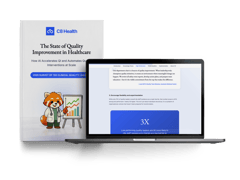
The Power of Data-Driven Decision Making in Healthcare
More and more healthcare professionals are developing a data-driven approach to improve patient care since relying on memory or intuition in such a critical field can lead to unreliable outcomes. Having trust in data that is accessible and consistent is essential.
Data comes in many forms in healthcare-from lab test results and imaging scans to research on the latest evidence-based practices. Why is this data important? Because it leads to dependable and standardized care. Oftentimes, healthcare information is siloed, leading to critical communication breakdowns and gaps in healthcare knowledge. A unified data framework is the key to seamlessly bridge these islands of data to improve clinical outcomes.
Let's look at how a shift to data-driven decision-making benefits healthcare practitioners and patients and guarantees quality care.
» Navigate the maze of knowledge management in healthcare
Meet the Expert
Mical DeBrow is an accomplished healthcare leader and clinician with extensive expertise spanning pharma, healthcare payers and providers, and healthcare information technology.
Why Real-Time Data Is Important
Data-driven decision making (DDDM) means using facts and insights gleaned from data to inform your choices, not just hunches or intuition. In healthcare, this means leveraging patient data, research, and analytics to make better diagnoses, prescribe effective treatments, and improve patient outcomes.
Real-time data is important because it provides practitioners with instant results from labs, imaging, or diagnostic testing, reducing the waiting time for results from weeks to minutes. Quick access to this information directly translates to timelier, safer, more efficient, and higher-quality patient-centered care.
3 Benefits of Data-Driven Decision Making
1. Improved Patient Outcome Through Personalized Medicine
By analyzing data on patient demographics, medical history, and treatment responses, clinicians can identify patient conditions with greater accuracy, helping to spot those at risk for certain conditions and develop more effective treatment plans. This can be used to develop personalized treatment plans for patients based on their individual genetic makeup and other unique factors.
Data can also be used to track and monitor the quality of care that patients are receiving. This helps identify areas for improvement and ensures that all patients are receiving consistent high-level care.
» Find out how AI and smart formats reshape healthcare data
2. Reduced Costs for Patients
DDDM can be used to identify areas of waste and inefficiency in healthcare delivery, which can lead to cost savings. For example, by analyzing data on readmission rates, hospitals can identify patients at risk of being readmitted and take steps to prevent this.
3. Improved Accuracy and Efficiency Reduces Medical Errors
Efficient patient data delivery is crucial for timely and accurate care. To prevent errors, seamless communication among systems is essential to deliver the right information to the right patient at the right time. Effective health systems can reduce rates of drug errors, misdiagnoses, and other healthcare inaccuracies.
Platforms like C8 Health offer data-driven insights that guide institutional knowledge management based on actionable and real-world data.
» Discover how risk management secures a healthier future for patients
How to Effectively Implement Data-Driven Decisions
There are three considerations to take on board when implementing and practicing data-driven decision-making:
- Data quality and integration: There is a need to ensure that all healthcare data is accurate, complete, and interoperable. C8 Health provides a vetted and unified platform that breaks down knowledge silos in healthcare departments, addressing the challenge of technological disconnect.
- Privacy and security: Patient data is sensitive, and it is important to ensure that it is protected from unauthorized access and use. Implement strong access control systems (such as multi-factor authentication), ensure your privacy policies abide by HIPAA standards, and train staff to adequately understand the importance of upholding patient privacy and security.
- Clinician buy-in: Not all clinicians are comfortable with using data to inform their decisions. It's important to provide clinicians with the training and support they need to feel confident.
Find out how Dr. Daniel Katz (Vice Chair of Education, Department of Anesthesia, Mount Sinai) uses C8 Health to easily access information to streamline knowledge dissemination with his staff:
Embracing Change With Data-Driven Decisions
Data-driven decision-making is the future of healthcare. By harnessing the power of data, we can improve the quality and efficiency of care and, ultimately, lead to better health outcomes for patients.
Effective data-driven decisions require trusted platforms that integrate information seamlessly, making it easily accessible for healthcare professionals. The value of data is only realized when it can be easily understood, accessed, and applied by doctors and nurses in caring for their patients.


